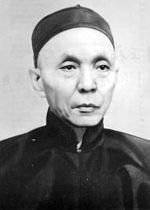Wong Nai Siong
| Wong Nai Song | |
|---|---|
 |
|
| Personal details | |
| Political party | Chinese Alliance Party |
| Spouse(s) | [First wife - Mdm Xie] [Second Wife - Mdm Qian] |
| Religion | Christian The Methodist Episcopal Church |
Wong Nai Siong (Chinese: 黄乃裳) (1849—1924) as a Chinese revolutionary leader and educator from Minqing county in Fuzhou, Fujian province, China. He served in The Methodist Episcopal Church for many years and participated in the "Letter to Bus" reform, Hundred Days' Reform and also the Xinhai Revolution which resulted in the formation of Republic of China on Taiwan. He also led people from Fujian province to migrate to other countries including Malaysia, especially Sibu, Sarawak.
Wong Nai Siong was born in Fuzhou Ming Qing, where his father was a carpenter and his family was very poor. He had to work in the farm and study at the same time to provide for the family. In 1866, missionaries from the Methodist Episcopal came; Wong Nai Song was baptised and converted to Christianity in November that year. Although it was not to the liking of the villagers, he was not ostracised as they still regard him as from the same clan. As time went by, the villagers also converted to Christianity.
In the winter of 1867, priest Xu Yang Mei took Wong Nai Siong as an assistant and taught him the Bible. This led to Wong Nai Siong's learning English and being exposed to Western culture and thinking. When asked his reason for converting to Christianity, he explained that he was appalled by the disparity between the teachings of Confucius and the actions of those who professed Confucianism.
During his missionary time, Wong Nai Siong felt that there was a lack of influential people in the church. He decided to take part in the Imperial Examination so that he could increase the church's influence. In 1877, he became a scholar. His father died in 1884. In 1894, Wong Nai Siong graduated with a 30th position in the Imperial Examination.
In 1894, Wong Nai Siong's third brother was killed in the First Sino-Japanese War. Wong Nai Song was disappointed with what he regarded as an incompetent and corrupted government, which he believed had led to the downfall of his country. He got acquainted with Kang You Wei in Beijing and took part in the "Letter to Bus" reform. In 1896, he started the first Christian newspaper which promoted political reform. In 1897, he once again sat for the Imperial Exam. He submitted eight petitions for reform. Following the failure of the reform movement, he was pursued by the Qing government, forcing him to flee back to Fujian.
...
Wikipedia
